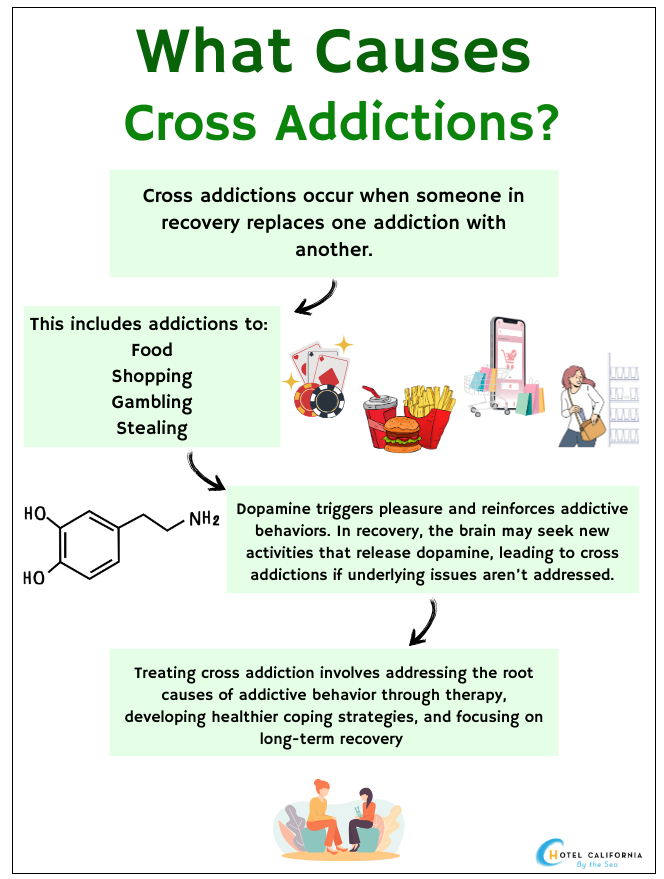Do you have a Cross Addiction?
Is it possible to move from one addiction to another? Is it possible to substitute one addiction for another addiction? Yes. This phenomenon is called cross addiction. Also known as addiction interaction disorder, substitute addiction, addiction hopping or addiction transfer, a cross addiction occurs when a person substitutes one form of addictive behavior for another type of addictive behavior. According to a report from the National Survey on Drug Use and Health, an estimated 20 million people have an addiction problem in the U.S. It is assumed that an estimated 80% of those people carry the risk of developing a cross addiction.

Having an addiction is defined by continued use of substances or engaging in a specific type of behavior despite continued potential problems, harm and negative consequences that arise on account of that behavior. Substance addiction is excessive and problematic use of alcohol and drugs, which is often characterized by physical dependence, tolerance and withdrawal symptoms. However, addictions don’t always revolve around substance use. Some other types of addiction can include an addiction to food, gambling, sex and other types of compulsive behaviors. When a person develops a cross addiction, they can have a drug addiction that transitions to or is replaced by another type of addiction such as alcohol, eating or gambling.
Cross addictions are more likely to happen in people who are already struggling with a substance use disorder or alcohol addiction. In fact, according to research from the University of Michigan, people with alcohol addiction are about 18 times more likely to report also having a prescription drug abuse problem, than those who do not drink. Cross addictions also occur due to dopamine deficiency. When a person with a drug addiction decreases drug use, their dopamine levels decrease. This causes them to turn to other substances to boost that dopamine level again in order to feel good and sometimes to alleviate the feelings of pain and discomfort if they experience withdrawal.
What is a Cross Addiction?
A cross addiction is when one form of addiction is replaced with another. This is when a person has two or more types of addictive behaviors. In some cases, cross addictions don’t always involve drug and alcohol use. But oftentimes, cross addiction occurs when a person substitutes drug use for another type of addiction or vice versa. Sometimes cross addictions don’t even occur at the same time. They may occur simultaneously or may replace one another.
For example, a person may be in recovery for alcohol use disorder and has stayed sober for many years. Somehow they will have developed an addiction to another drug or begin to engage in compulsive behaviors that also trigger the brain’s reward center. Despite being sober and addiction-free for years, it is still possible for this person to develop a different type of addiction replacing the previous one with a new one in order to stimulate the dopamine reward center in the brain. In cross addiction, people can replace their substance use disorder with an impulse control disorder because they both stimulate the reward pathway in the brain.
Is a cross addiction the same as a co-occurring disorder? They may sound similar, but they are two different concepts. Cross addictions are defined as a person having multiple addictions that happen at the same time or consecutively. A co-occurring disorder refers to a person having a substance use disorder alongside one or more mental health conditions.

Common types of Addiction
- Substance addiction – Substance addiction involves ingesting substances such as drugs and alcohol that directly manipulate the experience of pleasure and provide mood-altering effects. Alcohol is a type of substance addiction. Alcohol is widely acceptable and easily accessible. Prescription medications can develop into a substance addiction as well as the use of illicit mind-altering substances.
- Behavioral addiction – behavioral addiction involves engaging in compulsive behaviors that can potentially become addictive and result in events or feelings that elicit pleasure and mood-altering effects. Examples of behavioral addictions include sex addiction and binge eating addiction.
- Exercise – Exercising is most often perceived as a healthy and positive trait. However, it can become problematic when a person excessively exercises leading to lactic acid and the build-up of other toxins that contribute to bone, muscle and tissue atrophy.
- Gambling – A gambling addiction is another type of behavioral addiction. It often entails the user to feel a sense of adrenaline, surprise and excitement. All of these traits stimulate the brain’s reward system.
- Shopping – A shopping addiction involves compulsive buying and engaging in unhealthy shopping habits in an attempt to feel good. This type of addiction often leads to financial burdens.
How does Cross Addiction occur?
Cross addiction can occur for many reasons, but it is most often accidental. In some cases, people in the early stages of substance addiction recovery are often more prone to developing a cross addiction because their brain is still healing and still looking for the dopamine rush drugs give them. So they will turn to other types of behaviors or even other substances that stimulate the brains reward pathway in order to experience those same feelings.
The lack of understanding about addiction is a factor in developing a cross addiction. For example, a person who is addicted to one substance can be prescribed another to help treat withdrawal symptoms or side effects of the original addiction. This person then believes they can use it responsibly without becoming addicted. However, over time, the person may begin to slowly develop an addiction to the new substance being used. They are unaware of the risks of using and the risks of developing a new addiction on top of the one they already have. This is one of the biggest risk factors for developing a cross addiction: the presence of an already existing addiction. People who have one addiction are much more likely to develop a cross addiction.
Another reason why cross addiction can occur is due to unresolved mental health conditions. People who have co-occurring mental health disorders, people who have a history of trauma and people who have depression and anxiety are more prone to developing a cross addiction. This is due to feelings of isolation, loneliness or emotional pain. Users often seek out substances like drugs and alcohol to try and dull the pain or try and experience a sense of euphoria. Turning to a new addiction is the user finding a new way to stimulate the brain’s dopamine reward system.
Check Your Insurance Coverage for FREE
Find out if your insurance covers addiction treatment in minutes. We accept most insurance!
Theories of how Cross Addiction can occur
There are two main theories of why and how cross addiction usually occurs. The substitute hypothesis considers that a person will substitute one addiction for another if the new addiction provides at least one function that the original addiction provided. The typology hypothesis considers that different types of addictive behaviors are linked and can be categorized together through a common characteristic and function. Because of this, people will gravitate toward certain types of addictive behaviors that are commonly associated with one another.
Other factors that can increase the risk of developing a Cross Addiction
- Forced abstinence – When a person is unable to access their original addictive substance, they often seek an immediate alternative. This can usually be in the form of another type of substance that produces similar effects.
- Harm reduction – When a person decides to stop their original form of addiction to find an alternative behavior that provides similar effects, that is what is called harm reduction. Users believe switching to an alternative substance with fewer risks or without as many negative consequences, is a comparably better option and they believe it will not cause an addiction.
- Relapse prevention – Relapse prevention is when a person learns and practices a new behavior to reduce the risk of relapsing from their addiction. However, in some cases, adopting a new behavior can lead to the risk of developing a new addiction.
- Stresses of daily life – In some cases, a cross addiction can occur due to the stresses and pressures of everyday life events and activities. For example, a recovering alcoholic with 10 years of sobriety suddenly has a death in the family. This life-changing event could trigger feelings of anger, anxiety and depression. This leads to the inability to cope and may cause the user to turn to substances to help them self-medicate. Eventually, they will turn to stronger and more potent drugs.
Reach out to Hotel California by the Sea
We specialize in treating addiction and other co-occurring disorders, such as PTSD. Our Admissions specialists are available to walk you through the best options for treating your addiction.
Do you need treatment for a Substance Addiction or a Cross Addiction?
Having a drug or alcohol addiction can be difficult to overcome. Having a cross addiction can pose an even greater challenge. Professional behavioral health treatment programs such as Hotel California by the Sea can provide the tools and resources clients need to address their addiction issues. We provide all levels of care including detox, residential, PHP and IOP. We utilize the most effective behavioral treatment methods such as CBT, DBT and EMDR therapy. Hotel California by the Sea is dedicated to helping our clients through every stage of their recovery so they can achieve their goals of sobriety.
References:
https://www.hazeldenbettyford.org/articles/what-is-cross-addiction
https://www.ncbi.nlm.nih.gov/pmc/articles/PMC9261223
https://www.psychologytoday.com/us/blog/addiction-and-recovery/201904/the-challenge-cross-addiction
https://www.drugrehab.com/addiction/cross-addictions
https://www.choosingtherapy.com/cross-addiction/
